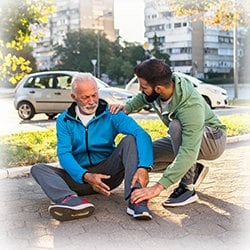19 Steps to Prevent Falls
Fall risk increases as you age, but these tips make it less likely you’ll fall and get injured.
 Each year, millions of people fall. In fact, it happens to one out of four people over age 65. Although many falls do not cause injuries, falls are the leading cause of injury in adults within this age group. One out of five falls causes serious injury, such as a broken bone or head injury. Falling once doubles your chance of falling again.
Each year, millions of people fall. In fact, it happens to one out of four people over age 65. Although many falls do not cause injuries, falls are the leading cause of injury in adults within this age group. One out of five falls causes serious injury, such as a broken bone or head injury. Falling once doubles your chance of falling again.
“The good news is that falls can often be prevented,” says Albert Bui MD, PIH Health physician who is double board certified in geriatrics and internal medicine. Dr. Bui suggests that as we age, we practice as many of these tips as possible to prevent a fall:
At Home:
- Remove tripping hazards. Clear items such as floor mats or rugs that may cause you to fall. Keep pathways clear of clutter.
- Hold hand rails. Always grab onto railings when going up or down the stairs.
- Store items within easy reach. You’re less likely to lose your balance if you don’t have to stretch or bend to retrieve items.
- Use non-slip mats. Place non-slip mats in areas that may get wet, like the shower, kitchen or laundry room.
- Light it up. Add lighting to stairwells and hallways to prevent tripping.
- Clean spills immediately. If you can’t bend down to clean the spill, ask someone else to help so you don’t slip.
- Install grab bars. Much like a hand rail, a grab bar can prevent a fall. Have a professional install grab bars in the tub or shower and near the toilet for added protection.
Outdoors:
- Wear the right shoes. Choose sturdy shoes with good traction, especially when it is wet, snowy or icy outside.
- Stand up carefully. When you exit a car, place both feet firmly on the ground and hold the door frame to steady yourself.
- Avoid slippery areas. Avoid wet grassy surfaces, or concrete that may become slippery when wet.
Pay Attention to Your Surroundings:
- Watch where you’re going. Pay attention to what’s in front of you so you can avoid obstacles. Look down with your eyes only.
- Take your time. Being in a hurry increase your chance of falling.
- Move slowly and deliberately. Quick movements may cause you to lose your balance. Taking shorter steps helps keep your body more stable.
Evaluate Your Fall Risk:
- Talk to your doctor. Ask your doctor how any health conditions you have may affect your risk of falling.
- Review medications. Some medications may cause dizziness or drowsiness, increasing your risk of falling.
- Get screened for osteoporosis. This disease weakens bones and makes it more likely they’ll break if you fall.
- Visit the eye doctor. Have your eyes checked every year. Poor vision can increase your chance of falling.
- Use assistive devices. If your doctor recommends using a cane or walker, use it.
- Exercise. Physical activities that improve strength, flexibility and balance lower your fall risk. Tai chi, yoga and water workouts are low-impact activities that may help.
Practice these steps to stay safe as you get older. Visit our website to learn more about Dr. Bui and the Internal Medicine services at PIH Health. Call Dr. Bui’s office at 562.789.5420.